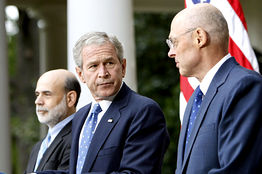 NPR’s Morning Edition today had a report on Governor Sarah Palin. Apparently she is taking a page from President Bush and carefully controlling media access. In other words: limited interviews, and no press access. What little press she has had has been bad. Between the ongoing investigation and her refusal to release her income tax records, one has to wonder if she really is ready for her current position of governor, much less that of vice president. One also has to wonder why the people of Alaska put up with this sort of behavior.
NPR’s Morning Edition today had a report on Governor Sarah Palin. Apparently she is taking a page from President Bush and carefully controlling media access. In other words: limited interviews, and no press access. What little press she has had has been bad. Between the ongoing investigation and her refusal to release her income tax records, one has to wonder if she really is ready for her current position of governor, much less that of vice president. One also has to wonder why the people of Alaska put up with this sort of behavior.
Say what you will about Senator Biden, either through intent or incompetence, he has a long history from which we can judge (and have). This leads to the first rule of governing: you have to show up, and Sarah Palin is not.
Worse, even when she makes statements they are plattitudes. Telling Americans not to question Israel is as destructive to the democratic process here at home as it is to Israel and her neighbors. We cannnot be an honest broker if we do not question all parties, and that is what the region needs most of all. Even the current administration recognizes the mistakes it has made. These were lessons that ought not to have been learned in office, and we certainly cannot afford for another administration to learn them again.
We need better.


